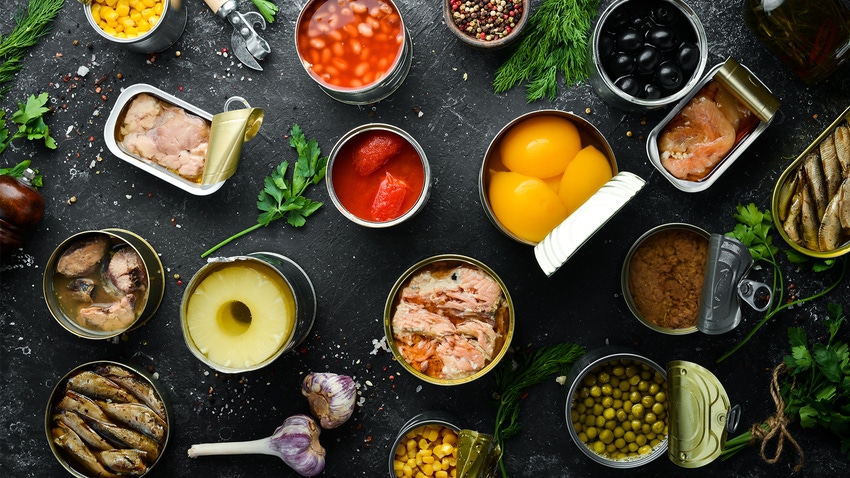Business Bites: New study finds high levels of chemicals in popular food products
On this week’s plate: A recent study by Consumer Reports found alarming levels of phthalates and bisphenols in various food and beverage products; Winter Food Fancy Show attracts thousands of global attendees for 48th edition; Arizona introduces new bill to ban the sale and production of lab-grown meat; and more.

At a Glance
- Consumer Reports tested 85 grocery and fast-food products and found bisphenols and phthalates in the majority of them.
- Winter Fancy Food Show welcomed tens of thousands global attendees and 1,200 F&B brands this year.
- Arizona representatives introduced a new bill that will ban the production and sale of lab-grown meat if enacted.
Food safety is and remains an important topic in the industry. FDA has been making strides with the Food Safety Modernization Act (FSMA), introduced in 2011 by President Obama, which was the most sweeping reform of the United States’ food safety laws in more than 70 years. Per FDA, it has transformed the nation’s food safety system by shifting the focus from simply responding to foodborne illness to actually preventing it, enabling the agency to better protect public health. Various bills have also been introduced over the last year to continue to strengthen food safety and transparency in the U.S. food system, but a recent study by Consumer Reports is shedding light on the work that still needs to be done. Also, Arizona joins Florida and Texas in an effort to ban the production and sale of lab-grown meat in the U.S. Learn more in this week’s column.
New report reveals harmful chemicals hiding in organic, nonorganic food products
A new study conducted by Consumer Reports shows that harmful chemicals are still present — at concerningly high levels — in some of the most-purchased food products in supermarkets and fast-food establishments alike, despite the country’s efforts to improve food safety. The nonprofit tested 67 grocery store foods and 18 fast foods, and found bisphenols and phthalates present in most products (79% of samples included bisphenols). The findings on phthalates were particularly concerning, since Consumer Reports discovered them in every food it tested, and at high levels, except for one product (Polar raspberry lime seltzer). Some of the products that contained the highest levels of phthalates, which are often deemed healthier F&B options by health professionals, included Annie’s organic cheesy ravioli (53,579 nanograms per serving), Del Monte sliced peaches (24,928 nanograms per serving), Chicken of the Sea pink salmon in water (24,321 nanograms per serving) and Fairlife Core Power High-Protein chocolate milkshake (20,452 nanograms per serving). Though it may not be surprising fast-food options contained higher levels of phthalates, such as Wendy’s crispy chicken nuggets (33,980 nanograms) and Chipotle’s chicken burrito (20,579 nanograms), the canned organic Aunt Annie’s product topped the list with more than 50,000 nanograms per serving.
Contamination doesn’t just happen during the packaging phase, however. Harmful chemicals like phthalates and bisphenols — which scientific research has shown can contribute to increased health risks, including diabetes, obesity, cardiovascular disease, cancer and neurodevelopmental disorders — can enter food products from the plastic in the tubing, conveyor belts and gloves used by individuals during food processing. They can even directly penetrate meat and produce through contaminated water and soil, Consumer Reports unveiled.
“The most immediate concerning aspect of our industry’s need to move away from phthalates is that we need our packaging suppliers to be proactive and find new materials that are safe to use,” Angela Anandappa, Ph.D., CEO of Alliance for Advanced Sanitation and food safety expert, explained. “When phthalates are removed from a product but simply replaced by a similar product that lacks scientific data to demonstrate safety, we aren’t doing ourselves any favors. We may well be introducing new risks that could potentially be even worse for human health, and that is not how we should be addressing this issue.
“So many paper products are coated with polymers that fall into the general category of ‘plastics,’ and replacing plastics with coated paper products does not solve the plastics problem,” she added.
Winter Fancy Food Show wins big in Vegas with specialty foods
This year’s Winter Fancy Food Show, held Jan. 21-23 in Las Vegas, brought together specialty food makers from around the globe. Hosted annually by Specialty Food Association (SFA), the event showcased thousands of products from exhibitors like Consumer Convenience Technologies, Funk Foods LLC and Controlled Labs.
"The Winter Fancy Food Show is a treasure trove of discovery, learning and connecting," Leana Salamah, SVP of marketing and communications at SFA, said. "In addition to 1,200 established and emerging brands showcasing thousands of on-trend products, we offer attendees deep dive data on the latest consumer habits in eating patterns and preferences, interactive demos of progressive cooking, serving and merchandising techniques, and multiple nightly events to experience the camaraderie of our industry and the excitement of Las Vegas."
In related news, Informa Markets is preparing for SupplySide East, taking place April 16-17 in Secaucus, New Jersey. This show brings 250 health and nutrition companies together with more than 3,000 industry experts and decision-makers to network and discuss innovations, solutions and insights on the topics defining the industry today. Click here to register.
Legislation to ban lab-grown meat proposition in Arizona
Arizona may soon join Italy by banning lab-grown meat. HB 2121, introduced by Rep. David Marshall, Sr. on Jan. 16, would prohibit the sale or production of cell-cultured animal products in the state if enacted. The bill, which is co-sponsored by four state representatives, defines a cell-cultured animal product as “any cultured animal tissue produced from in vitro animal cell cultures outside of the organism from which it is derived.” Violators would be subject to a civil penalty of up to $25,000, and anyone/businesses that are adversely affected by the sale of cell-based products would be able to sue the producers of said products for damages of up to $100,000. According to the state representatives, the new bill was proposed “as a measure to protect public health and the state’s sovereign interests,” while emphasizing “the importance of the cattle ranching industry to the state’s history, culture, economy and the funding of publish institutions through state land leases for livestock grazing.” Similar bills to ban the production and sale of lab-grown meat have also been introduced in Texas (HB 158) and Florida (HB 435).
Center for the Environment & Welfare (CEW), which is dedicated to helping consumers and companies navigate issues related to sustainability and animal welfare, supports all legislation pertaining to the ban of lab-grown meat in the U.S. “Arizona legislators are joining a growing chorus of consumer voices concerned about lab-grown meat — and rightfully so,” Jack Hubbard, executive director of CEW, said. “The lab-grown meat sector is facing increasingly strong headwinds as the public learns more about the use of ‘immortalized cells’ and the absence of long-term nutritional and health studies.”
Alarming number of microscopic plastic particles found in bottled water
Beware of bottled water, researchers now warn. A recent study, conducted by researchers from Columbia and Rutgers universities, analyzed three brands of bottled water and found the average liter contained nearly 250,000 pieces of nanoplastic. The researchers developed an intricate technology involving two lasers, known as stimulated Raman scattering (SRS) microscopy, to detect and identify the nanoplastics present in the bottled water samples. They reported 90% of the plastic pieces detected weren’t microplastics — plastic particles that are less than 5 mm in length — but nanoplastics, which are much smaller than microplastics — from 1 to 100 or 1,000 nm in diameter — and “believed to be more toxic since their smaller size renders them much more amenable, compared to microplastics, to enter the human body.” Researchers also reported that specifically in drinking water production, plastic contamination is confirmed in every step, from the well to the bottle.
Mars announces new snack R&D hub in Chicago
Global snack giant Mars recently opened a new R&D hub on its Goose Island campus in Chicago. The 44,000-square-foot, $42 million facility is the seventh Mars innovation site and focuses on chocolate and nut testing and research. By centralizing innovation components, it will serve as a testing ground for sustainable ingredients, allowing 300 Chicago-based Mars R&D associates to perfect recipes in small batches and then refine the process of bringing new products to scale. It will also be powered entirely with renewable energy credits from Mars’ wind farm in Ford Ridge, Illinois.
"This state-of-the-art facility will serve as the epicenter for the kind of groundbreaking research and development that will shape the snacking category for generations to come,” Andrew Clarke, global president of Mars Snacking, said in a press release. “Innovation has been at the heart of our success for over 100 years, and this significant investment reaffirms our unwavering commitment to staying ahead of the curve.”
Mars also recently announced the construction of a 339,000-square-foot, $237 million Nature’s Bakery facility in Salt Lake City to accelerate production of granola and snack bars.
Upcoming webinar from Naturally Network spotlights CPG trends
Naturally Network is kicking off the new year with a perfect opportunity to stay informed about upcoming market shifts. Its free webinar, “2024 Natural Products Industry Update,” is scheduled for Jan. 30 at 11 a.m. CST. The online panel will focus on CPG market trends for 2024, with insights from experts about retail and distribution, people and culture, flavors and ingredients, and other topics relevant to food and beverage professionals. Register today to gain insights from some of the biggest names in the industry, such as Food & Beverage Insider’s Content Director Audarshia Townsend.
“I’m excited to be part of this distinguished panel of experts,” Townsend said. “This is a great opportunity to share some of the valuable information we’ve been tracking for the past year with Naturally Network’s captive audience. From the latest in functional beverage trends to what to expect in women’s nutrition to the latest obsessions for Gen Z, there’s never a dull moment in what we’re producing at Food & Beverage Insider.”
About the Author(s)
You May Also Like








